Democrat Hous and Senate Voted Agains Civil Rights Act
The Senate and Civil Rights
More than
Images
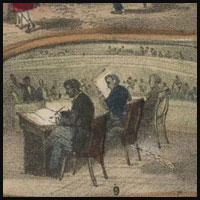
Video
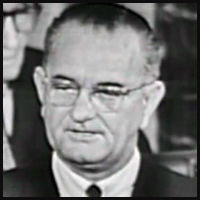
Documents
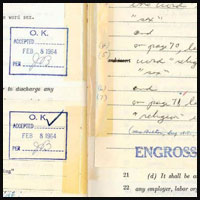
Biographies
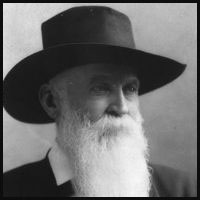
Oral History

Proponents Build a Strategy for Success
MORE
Audio

Video
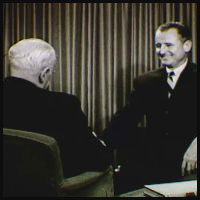
Images
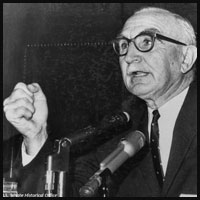
Documents
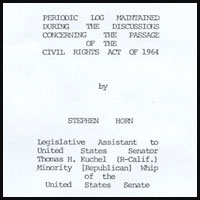
Biographies
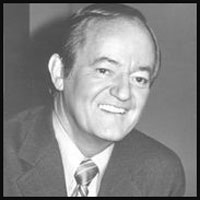
Oral History
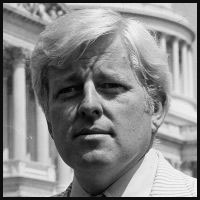
Cloture and Last Passage of the Civil Rights Act of 1964
More
Sound
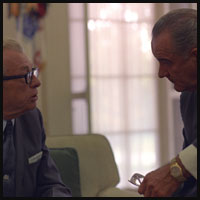
Video

Images

Documents

Biographies
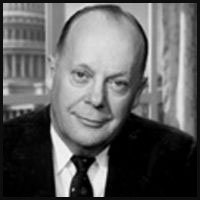
Oral History

1862

April 16: A bill originally sponsored by Senator Henry Wilson of Massachusetts, the DC Compensated Emancipation Act becomes law.
1863
January 1: President Abraham Lincoln bug the Emancipation Proclamation granting freedom to slaves residing in Amalgamated states not occupied past Spousal relationship forces.
1865
Dec 6: The Thirteenth Subpoena is ratified, abolishing slavery.
1866
April 9: Congress passes the Ceremonious Rights Human action of 1866 over President Andrew Johnson's veto.
1868
July 9: The Fourteenth Amendment is ratified, granting citizenship to all persons born or naturalized in the United states of america and providing them equal protection under the law.
1870
February 3: The Fifteenth Amendment is ratified, prohibiting states from disenfranchising voters "on business relationship of race, color, or previous condition of servitude."
February 25: Hiram Revels (R-MS) becomes first African American to serve in Senate.
1873
Nov 17: Supreme Court rules in favor of Senate employee Kate Brown in anti-discrimination case.
1875

February 14: Blanche Thou. Bruce (R-MS) becomes first African American to preside over Senate.
March one: The Ceremonious Rights Act of 1875 is signed into police (after overturned).
1896
May 18: Supreme Courtroom problems Plessy five. Ferguson conclusion, stating that segregation is constitutional equally long every bit facilities for blacks and whites are "equal."
1925
August 8: 35,000 Ku Klux Klan members march on Washington.
1939
Apr 9: Marian Anderson performs on steps of Lincoln Memorial.
1941
Jan 25: A. Philip Randolph proposes a march on Washington.
June 25: President Franklin D. Roosevelt problems Executive Order 8802 forbidding discriminatory hiring practices by federal contractors.
1948
July 12: Senate candidate Hubert Humphrey (D-MN) calls for civil rights plank at Autonomous National Convention.
July 26: President Harry Truman signs Executive Club 9981, de-segregating the armed forces.
1953
August 13: President Dwight D. Eisenhower, in Executive Guild 10479, establishes the Anti-discrimination Committee on Authorities Contracts.
1954
May 17: Supreme Court bug Dark-brown vs. Lath of Instruction conclusion, finding racial segregation in public schools to be in violation of the Constitution.
1955
January 15: President Dwight D. Eisenhower, in Executive Order 10590, establishes the President's Committee on Government Policy to enforce nondiscrimination in federal employment.
December ane: Rosa Parks refuses to give upwardly her seat on a Montgomery, AL, jitney, sparking the Montgomery Bus Boycott.
1957
September 27: The Civil Rights Act of 1957 is signed into police force.
1960
February i: North Carolina college students stage a sit-in at a department store in Greensboro, NC, that refuses to serve them because of their race.
May half dozen: Civil Rights Act of 1960 is signed into law.
1961
March 6: President John F. Kennedy issues Executive Lodge 10925, creating the President's Commission on Equal Employment Opportunity.
1963

June 19: President Kennedy sends to Congress his proposed civil rights bill. Senate Majority Leader Mike Mansfield (D-MT) introduces the bill and information technology is assigned to the Judiciary Committee. Minority Leader Everett Dirksen (R-IL) introduces some other bill, co-sponsored with Mansfield, which is similar to the administration's neb simply lacks a public accommodations section. Mansfield and Warren Magnuson (D-WA) introduce a separate public accommodations bill which is assigned to the Commerce Committee.
August 28: Reverend Martin Luther King, Jr., leads the March on Washington and delivers his speech, "I Have a Dream," in front end of the Lincoln Memorial.
September fifteen: A bomb at Sixteenth Street Baptist Church, in Birmingham, AL, kills 4 girls and wounds xx more children.
November 22: President Kennedy is assassinated in Dallas, Texas.Vice President Lyndon B. Johnson is sworn-in as president.
November 27: President Johnson delivers a spoken language to joint congressional session, calling for passage of Kennedy's civil rights neb.
1964

January 23: The Twenty-4th Amendment, abolishing the poll revenue enhancement is ratified.
Feb 10: House passes H.R. 7152, the Ceremonious Rights Deed, sending the bill to the Senate.
February 26: Majority Leader Mike Mansfield places H.R. 7152 directly on the calendar, bypassing the Judiciary Commission.
March 9: Mansfield introduces movement to brand the Civil Rights Act the Senate'south pending business and debate begins.
March 26: Senate votes to make H.R. 7152 pending business, 67-17.
May 26: Mansfield and Dirksen submit a "clean neb" as substitute for H.R. 7152.
June eight: Mansfield and Dirksen file cloture motion.
June 9-x: Senator Robert Byrd delivers the longest speech communication against the civil rights bill, speaking for 14 hours and 13 minutes.
June 10: For the first fourth dimension since Rule XXII was established in 1917, the Senate approves cloture on a civil rights bill, with a vote of 71-29. Everett Dirksen offers a memorable speech in back up of the neb. Quoting Victor Hugo, he declares, "Stronger than all the armies is an idea whose time has come up."
June 17: Senate adopts the Mansfield-Dirksen substitute bill with a coil call vote of 76-18.
June xix: Senate approves the Civil Rights Act of 1964.
July 2: House approves Senate bill, fugitive conference committee, and President Johnson signs Civil Rights Human action into law.
Source: https://www.senate.gov/artandhistory/history/civil_rights/civil_rights.htm
0 Response to "Democrat Hous and Senate Voted Agains Civil Rights Act"
Post a Comment